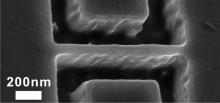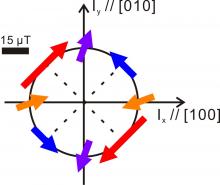
Spintronics makes use of the electron's spin degree of freedom to realise electronic devices and functionalities that cannot be achieved by the electron's charge degree of freedom alone. Our research activities are focussed on novel spin effects in magnetic, and also non-magnetic, nanostructures. Our principal experimental tool is a cryostat with a vector field magnet and microwave frequency electrical access.
 We are interested in the role of the spin-orbit interaction in ferromagnetic devices, and have been recently studying spin-orbit effects in ferromagnetic semiconductors. The spin-orbit interaction couples the momentum of the charge carriers, and therefore the electrical current, to the carrier spin. Hence by passing a microwave frequency current through a device, an oscillatory spin polarisation is induced. This causes, via the exchange interaction, a torque to act on the magnetic moments. In this way we are able to excite resonant precession of the magnetic moments (spin-orbit ferromagnetic resonance), providing a way to study the spin-orbit interaction and the dynamic properties of nanoscale ferromagnets.
We are interested in the role of the spin-orbit interaction in ferromagnetic devices, and have been recently studying spin-orbit effects in ferromagnetic semiconductors. The spin-orbit interaction couples the momentum of the charge carriers, and therefore the electrical current, to the carrier spin. Hence by passing a microwave frequency current through a device, an oscillatory spin polarisation is induced. This causes, via the exchange interaction, a torque to act on the magnetic moments. In this way we are able to excite resonant precession of the magnetic moments (spin-orbit ferromagnetic resonance), providing a way to study the spin-orbit interaction and the dynamic properties of nanoscale ferromagnets.
Our other projects involve using single electron transistors to study ferromagnets; further investigations of the spin-hall effect with our colleagues at Hitachi; and antiferromagnetic spintronics.
